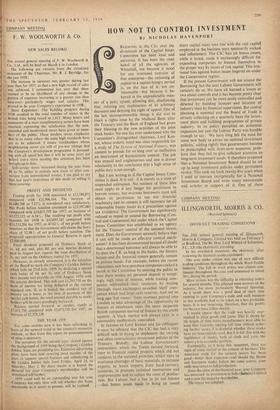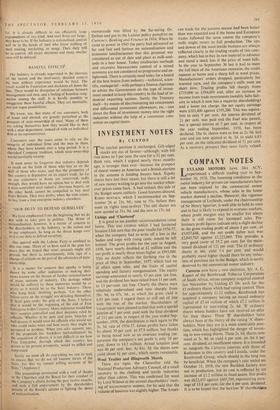HOW NOT TO CONTROL INVESTMENT
By NICHOLAS DAVENPORT
REJon.ING in the City over the divestiture of the Capital Issues Committee has been loud and universal. It has been the most hated of all the agencies of Whitehall, not because it stood for any irrational restraint of free enterprise—the rationing of capital in a capital-hungry period is, on the face of it, not un- reasonable—but because it be- haved in the unpredictable man- ner of a petty tyrant, allowing this, disallowing that, refusing any explanation of its arbitrary decisions and denying the right of appeal. One of the last incomprehensible things it did was to block a rights issue by the Midland Bank after the Treasury and the Bank of England had given their blessing to the new activities of the joint stock banks, No one has ever understood why the Committee's distinguished chairman, Lord Ken- net, whose orderly mind was once responsible for a study of The System of National Finance, was content to preside for so long over so ineffective an instrument of bureaucratic control. The job was unpaid and unglamorous and one is driven reluctantly to the conclusion that a high sense of public duty is not enough.
But I am writing as if the Capital Issues Com- mittee is dead. It is not : it is merely in a state of suspended animation. No resident of these isles need apply to it any longer for permission to borrow money, but overseas borrowers must still obtain its perMission to use our financial machinery and its consent is still necessary for all redeemable bonus issues as a precaution against tax avoidance. The Government has significantly refused to repeal or amend the Borrowing (Con- trol and Guarantees) Act under which the Capital Issues Committee was established as an agency for the Treasury control of the national invest-. ment. Does the Government seriously believe that it can still be made an effective control mech- anism? It has been demonstrated beyond all doubt that a determined borrower will always be able to by-pass the CIC as long as the banks, the finance houses and the financial system generally remain in private hands. For example, before the recent relaxations new hire-purchase companies.cocked a snook at the Committee by enticing the public to lend them money on personal deposit at tempt- ingly high rates of interest, while trading com- panies replenished their resources by buying (through share exchanges) so-called 'shell' com- panies which had large cash reserves. And not so long ago 'hot money' from overseas poured into London to take advantage of the opportunity to finance at exorbitant rates the more .desperate British companies starved of finance by the credit squeeze. A black market will always exist in a commodity ineffectively controlled.
In fairness to Lord Kennet and his colleagues it must be allowed that the CIC has had a very difficult task in trying to implement the varying and often contradictory investment policies of the Treasury. Broadly, the Labour Government's instructions, which the Tories carried forward, were to frustrate capital projects which did not conform to the national priorities, which were to overcome shortages of basic materials, to increase exports, to lessen imports from hard-currency countries, to promote technical innovations and improvements and to reduce the costs of produc- tion. But Labour had a bee in its red bonnet —that bonus issues made to bring an issued
share capital more into line with the real capitat employed in the business were necessarily wicked and inflationary. The CIC ban on bonus issues, while it lasted, made it increasingly difficult for expanding companies to finance themselves in the proper way by issues of risk capital. This irra- tional bias against bonus issues lingered on under- the Conservative regime.
If the present Government will not amend the Borrowing Act the next Labour Government will certainly do so. We have all learned a lesson or two about controls and it has become pretty clear that investment can be more easily controlled and dii.ected by building licences and location of industry than by financial supervision. But central planning is essential and the Board of Trade is. already collecting on a quarterly basis the invest- ment plans and building programmes of private industry. In its policy pamphlet on economic expansion last year the Labour Party was humble enough to say : 'We have long felt the need for some new body to advise on national investment policies,' adding rightly that governments become. so preoccupied with short-term economic prob- lems that they fail to give sufficient attention to- long-term investment needs. It therefore proposed that a National Investment Board should be se( up to keep investment policies under permanent review. This took me back twenty-five years when I used to canvass energetically for a National. Investment Board and write many memoranda and articles in support of it. One of these memoranda was lifted by the far-seeing Dr. Dalton and put in the Labour policy pamphlet on Currency, Banking and Finance in 1934. When he came to power in 1945 the party had advanced so far and fast and furious on nationalisation and economic totalitarianism that this proposal was considered as out of date artd place as milk-and- soda in a beer house. Today totalitarian methods and excessive bureaucratic control of a mixed economy are not considered so progressive and en- lightened. There is certainly need today for a board of the best brains from industry-technical, scien- tific, managerial-with perhaps a finance chairman to advise the Government on the type of invest- ment needed to keep this country in the lead of in- dustrial exporting nations. Surely the Treasury itself-by means of discriminating tax concessions and differential investment allowances, etc.-can direct the flow of investment money into the right industries without the help of a commissar com- mittee on capital issues.







































 Previous page
Previous page